everything is art to the right audience (four things friday, vol 2)
four things of the week: an album, a movie, a poem, and a musing.
FOUR THINGS FRIDAY! Every week, I’ll pop into your inbox with a four-item list of things I’ve enjoyed or endured over the past week. Sometimes it’ll be recommendations or miniature reviews; other times, it’ll just be my random musings. Enjoy!
1. THE ALBUM — Perverts (2025) by Ethel Cain
This was actually released last week and nearly made it onto my list for four things friday (vol. 1) but it wasn’t until this past week that I truly had the chance to sit with the body of work—and the online reactions to it. Many people, including fans of Ethel Cain and others, aren’t quite getting it.
“Where are the lyrics?” someone asked on my Twitter (X) timeline the morning the album dropped. I remember seeing the tweet and glancing at the time: five minutes past midnight. They were only five minutes into the album’s first track, yet already eager for Cain to hand them a story to dissect, rather than simply experiencing the music on their own.
Of the nine tracks on Perverts, only three fit the contemporary definition of “songs” with lyrical verses, a chorus, and a bridge layered over an instrumental (“Punish,” “Vacillator,” and “Amber Waves”). The other six focus on creating atmosphere. Housofpsychoticwomn, for example, is a thirteen-minute track where Cain obsessively repeats “iloveyouiloveyouiloveyouiloveyou” over a distorted, whirring soundscape. Pulldrone is exactly what its name suggests—fifteen minutes of a droning pulldrone that fades in, sputters out, and repeats.
This album isn’t about Cain telling a story. Sure, in the songs with lyrics she explores themes of transgressive sexuality within the context of religion and societal expectations, but I find that the album is more about perverting the audiences expectations of Ethel Cain’s work. An artist often hailed for her lyrcisim makes a new album with barely anything new for her fans to read. Of course it’s a little jarring but that seems to be exactly what Cain wants. Perverts isn’t about feeding you a narrative, it’s about creating a space for you to exist—an environment for you to sit with the unsettling sounds, and all the thoughts and emotions it stirs. It challenges you to confront the uneasy introspection it evokes, leaving you to explore where this auditory meditation takes you, if it takes you anywhere at all.
. . . due to time period or societal pressures or whatnot, things needed to be explained, espeically if they did well on any measure of impracticality, they needed to have a reason. Whereas, I don’t really care about reasons. I care about “does it feel good, does it feel true, does it invigorate, does it inspire, does it captivate, does it enrapture?” So, sometimes, almost reading the explanations for certain things makes me like it less.
— Ethel Cain in tour of my art books (part 2) on Youtube (at 1:22:45).
2. THE MOVIE — Queer (2024) dir Luca Guadagnino
Based on the novella of the same name, Queer (1985) by William S. Burroughs, Queer (2024) is set in 1950s Mexico City. It follows William Lee (played by Daniel Craig), an American expat grappling with addiction to booze, to men, and to harder substances. His life becomes even more complicated when he meets a younger American expat that has newly arrived in the city—a Eugene Allerton (played by Drew Starkey).
I’m not queer. I’m disembodied.
— Queer (2024)
This film is obsessed with bodies—flesh pressed against flesh, tongues slicking against one another, sweat on brows and in eyes, spit in mouths and on skin, needles piercing veins, legs intertwined or missing entirely, and the uncontrollable shivers of opioid withdrawal. Guadagnino’s lingering camera captures it all, creating an intimate yet voyeuristic perspective. Despite Queer being fixated on bodies, the main character, Lee, spends the entire film attempting to escape his very own through his indulgence in his many vices. He yearns to detach himself from himself, from the very ground he walks on. I enjoyed the movie and I recommend it, yet I can’t help but feel that this sense of "groundlessness" seeped into the way the story was structured.
Like a lot of Guadagnio’s work, I fucked with the vibe of the film. The cinematography has a distinct texture that transports you, perfectly capturing the essence of films from a bygone era. Despite the tactile nature of the film’s aesthetic, there’s not much else to grasp onto or sink your teeth into in terms of plot or character exploration. Most, if not all, of the introspection done with the characters are done through drug-induced dream sequences that flash across your screen but then aren’t further addressed. I couldn’t tell you much about the lives of Lee or Allerton before they arrived in Mexico City. Most of what I know is based on inference, which would be acceptable if the movie’s runtime weren’t a full two hours and fifteen minutes. That’s plenty of time, in my opinion, to give me something with more weight. The third act felt especially frustating because of how abstract it was. There was a prolonged drug trip scene that felt so out of place, even for an A24 we-make-weird-cinema film.
Still, the performances were solid from both Craig and Starkey, and Guadagnino’s directorial chops are nothing to frown upon. I guess I just wanted more from story at the centre of it all.
3. THE POEM(s) — Calling a Wolf a Wolf (2017) by Kaveh Akbar
Using his past struggles with addiction and religion as primary fuel, Kaveh Akbar has complied fifty-seven poems into a collection that explores themes of recovery, faith, the battle between the mind and the body, and the never-ending struggle to balance desire with self-doubt. I could go further but no one speaks for himself better than Akbar does. Here are some of my favourite poems from the collection so far:
4. THE MUSING — On being intimidated by poetry.
There’s a common sentiment I share in the reviews of some of my favorite books—one you’ve probably noticed if you read my newsletters with any regularity. I frequently find myself saying, “Poets make the best novelists,” and my reasoning is simple: they don’t hand-hold the reader through the narrative.
In many of the debut novels I’ve been reading recently, I’ve noticed this hand-holding. A strong and frankly impressive metaphor might appear, only for the author to explain it in the next sentence, essentially reiterating the same idea in simpler terms. Dialogue might deliver key exposition, only for the prose to repeat it, as though the author is worried the reader might have missed it the first time—or skimmed over it entirely. In some ways, this approach feels intrusive, as though the author doesn’t trust the reader to grasp the story on their own. It’s as if the author is imposing their narrative, so afraid that their meaning will be misconstrued that they begin to overcompensate. And, what do we get as a result? A suffocating grip on the reader, one so tight it stifles the story itself.
Poets don’t show this fear. And that’s what makes them—and their work—so intimidating to me.
In a novel, even if you miss the point in the first few chapters, there are 50,000+ words left to catch up. There’s time to walk alongside the author, shoulder to shoulder, and arrive at the novel’s conclusion together. Poets operate differently, I think. Poets sprint ahead, indifferent to whether the reader is keeping pace with their metaphors, literary choices, or overall intended meaning. There’s no hand-holding in poetry, no slowing down for the sake of clarity. You either make it to the poet’s intended destination—through careful reading and re-reading—or you don’t arrive at all. You either get it, or you don’t. This makes poetry good! This makes poetry selfish! Good, selfish poetry works as a sieve, allowing only those who can examine its finer details to pass through. If you’re even slightly unwilling or unable to engage deeply, you’re left behind.
This is exactly why poets and the act of writing poetry intimidate me. Honestly, maybe this is why any and all quote-unquote good artists intimidate me. I’m still so preoccupied with creating art that is understood by everyone, striving for universality. The best artists seem unconcerned with that; their work exists unapologetically, and they demand effort from those who engage with it. Cain, Guadagnino and Akbar don’t seem preoccupied with the fear of being misunderstood. In fact, it often feels like they encourage it.
Are there instructions for viewing a painting.
[. . .]
Remember. No instructions. Keep up or walk off.
— Something you call the sun by C.S. Mee (The Deep)
The first time my literature was misunderstood, I was eleven years old. Eleven-year-old me being newly introduced to the world of Gothic literature, a world of literature that took the backdrop of my childhood religion, Catholicism, and twisted it into tales of corruption, sin, and the grotesque. My English teacher handed out Edgar Allan Poe’s poem The Raven and The Tell-Tale Heart, and told us to read them, pull whatever meaning we could, and return the following week with our own pieces of creative writing. I did exactly that. But when the next lesson rolled around, and the teacher returned everyone’s work, I got nothing.
When I alerted the teacher to the fact that I hadn’t received my work, he immediately asked if I could stay behind after class. I remember the room erupting into a chorus of ooooooohs, all my classmates, entertained by the prospect of the teacher’s pet getting reprimanded. My teacher winced. I winced back. For a moment, we shared a silent understanding that somehow, somewhere, we’d both misstepped.
The lesson dragged on, but I absorbed none of it. Blah blah blah grief. Blah blah blah madness. Blah blah blah the haunting inevitability of death. When it finally ended, my classmates trickled out into the hallway for lunch, tossing me half-amused, half-sympathetic glances as they left me behind. When the door shut, it shut on me, my teacher and my work.
It was all very dramatic. He plucked up my paper and pulled up a chair, the wood creaking under his weight. Seated, he took a deep breath and asked what had inspired my piece. The answer seemed pretty obvious: Edgar Allan Poe. But apparently that wasn’t satisfactory. For about ten more minutes, as my lunch break slipped away, we circled back to the same question. What had made me write…that?
The details of what I wrote are a bit hazy now. I remember a girl and a wound stretching across her abdomen. There was no blood—I recall that pretty vividly—but instead, spilled petals, tangled vines, and spiraling branches filled her bedroom. They jammed the door so tightly that no one could get in when their knocking went unanswered. There was even a rhyme scheme, for fuck’s sake—ABAB. I had poured my soul into the thesaurus the night before the homework was due, proud of the character I’d created, the metaphor I was sure I had nailed. I expected glowing praise and a call to read it in assembly as a reward. Instead, I was losing my lunch break.
Maybe what I wrote was a bit much for an eleven-year-old. Maybe. But at the time, I couldn’t understand the uproar. I didn’t understand why my teacher was so concerned, why the school called my parents, or why I ended up on a wellness check-in list. Weekly meetings with my Head of Year, answering questions on my mental health and how I was fairing at home. I’d written a poem—rushing to the end, too focused on the destination to notice if anyone was keeping up—and suddenly, I was being questioned for it. Is that where it started, do you think? My deep-seated fear that a reader’s lack of understanding is a fate worse than death? Worse even than not creating at all?


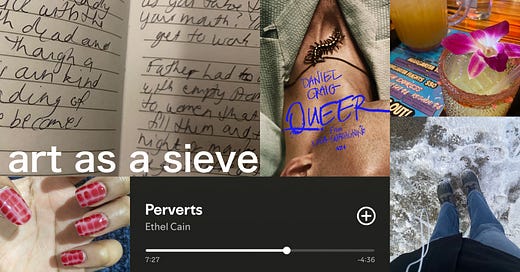




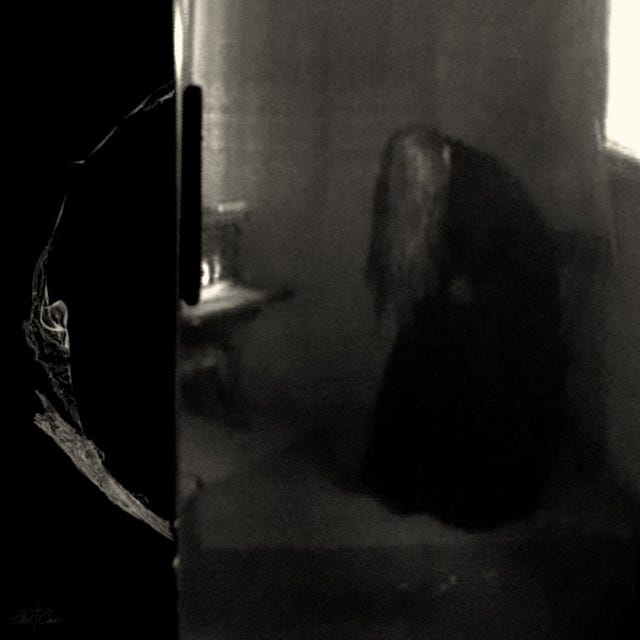
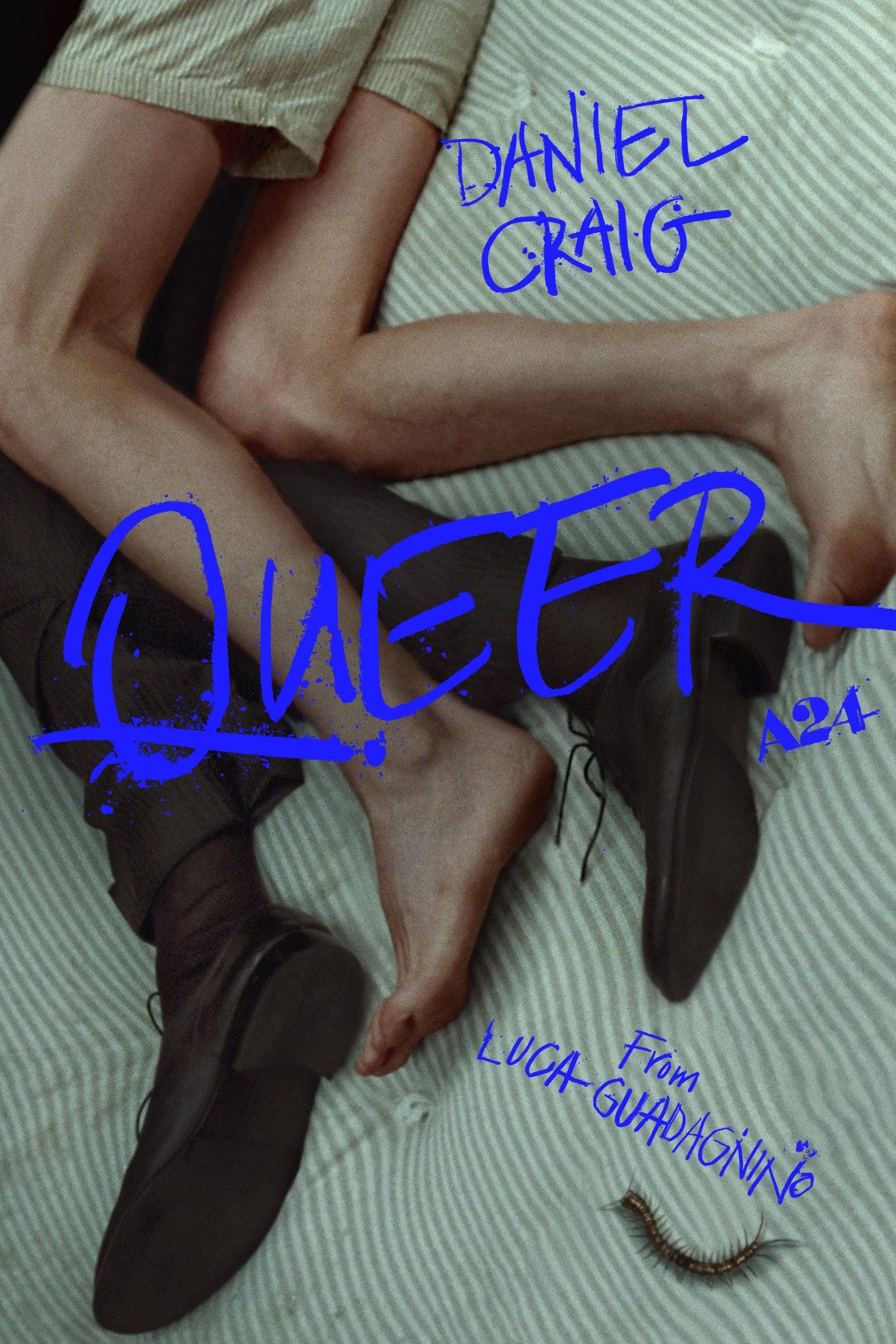
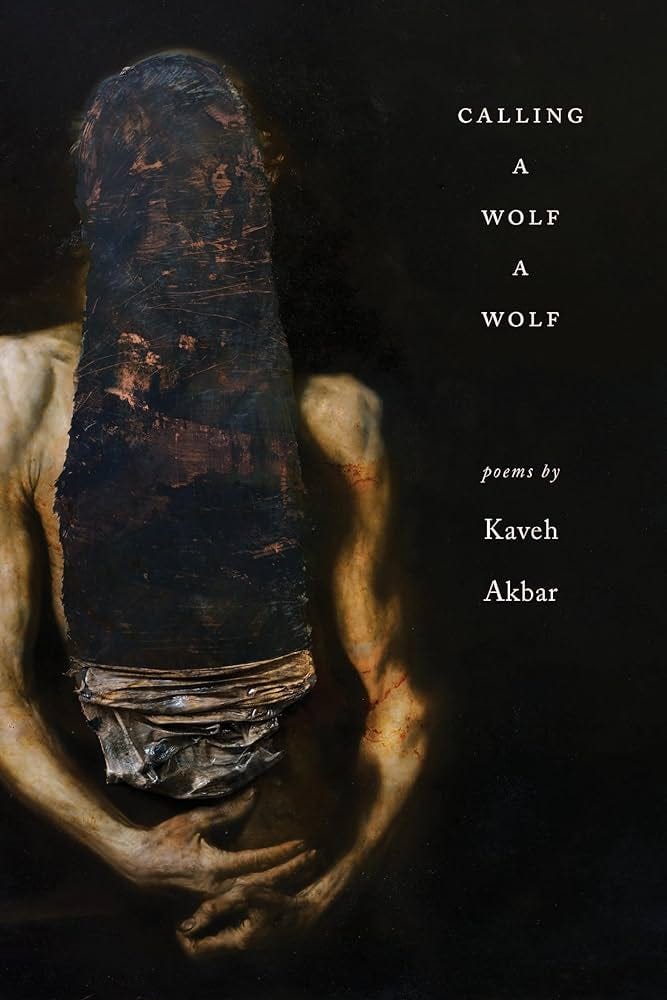
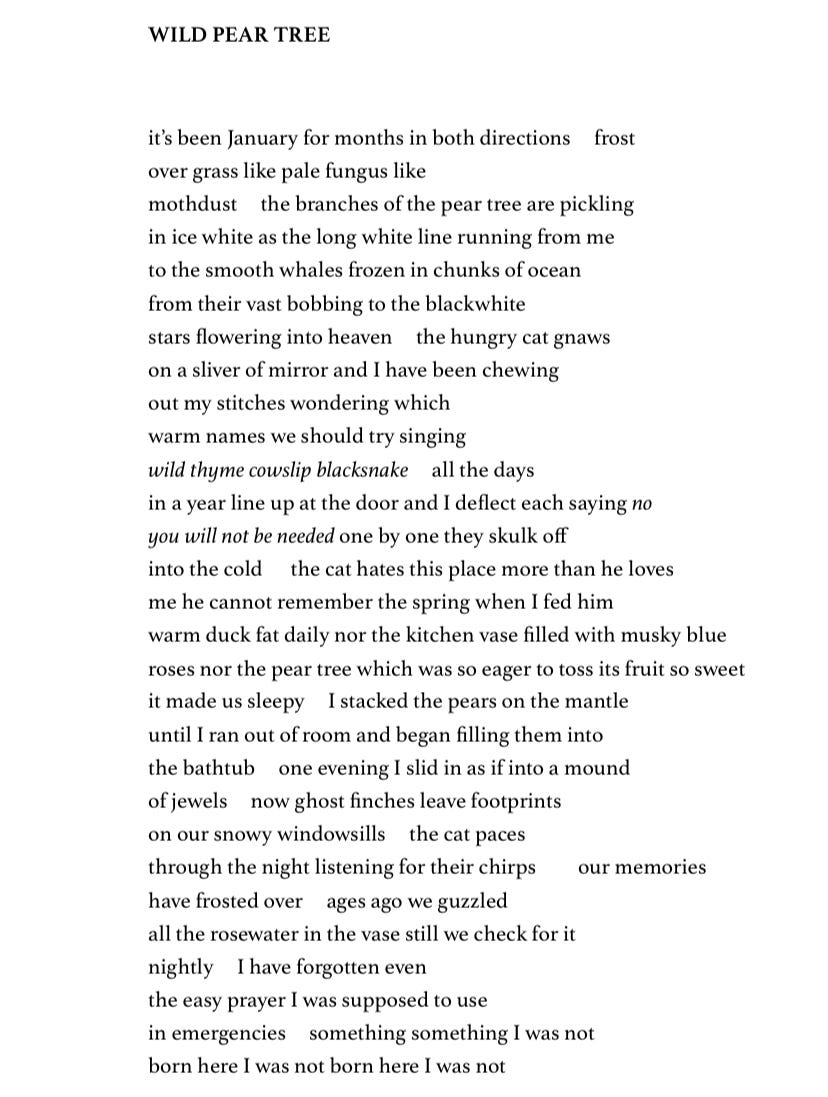
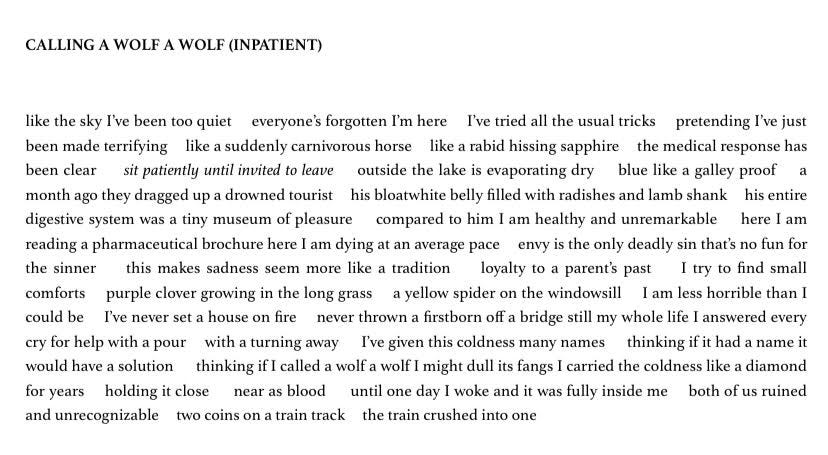
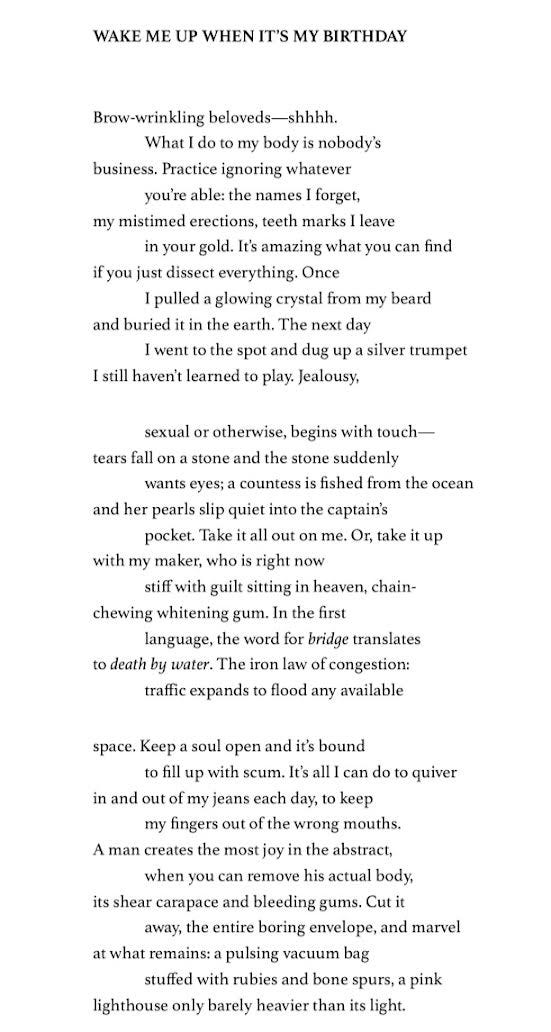
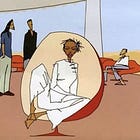

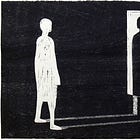
I love how you describe poets and poetry in itself - "Poets sprint ahead, indifferent to whether the reader is keeping pace with their metaphors, literary choices, or overall intended meaning."
I think that's why poetry is so fun to read for me as my brain gets disjointed in the process of it, every line, verse, word will cut, reassemble, entangle thoughts and images I can already have in mind. Sometimes, it takes me where the poet maybe wants to take us, sometimes it doesn't but it will take me somewhere else. The end result is the same, we feel. A lot. And even if in the moment we feel nothing at the sight of words I realised it comes back at crucial moments.